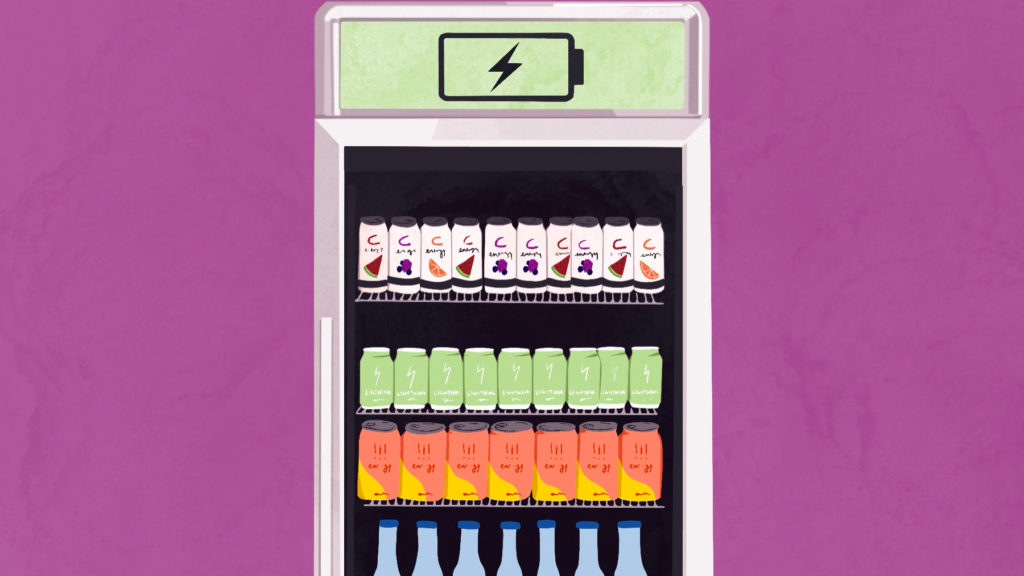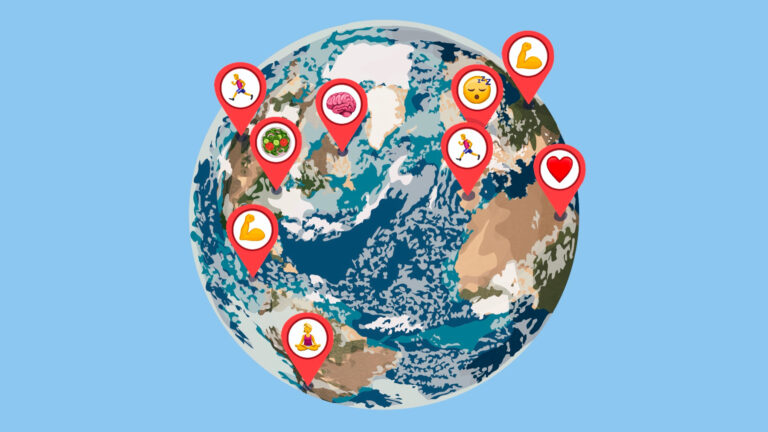Gunning for Red Bull and Gatorade, beverage brands are banking on energy-boosting elixirs.
Clean Energy
Consumers are thirsty for a pick-me-up.
Among US adults, energy (37%) and weight loss (30%) are the most desired benefits of food and beverages.
At the same time, as the harmful effects of the American diet become undeniable, health-minded consumers are cutting out sugar. In particular, younger generations are seeking functional nutrition and ingredient transparency.
Shifting demand coupled with declining soda sales set the stage for a so-called “clean energy” boom:
- Sports drinks are expected to bring in $30B worldwide by 2025.
- The global energy drink market is expected to top $175B by 2030.
Taking notice, upstart and incumbent brands are targeting the space by eliminating sugar and adding caffeine while promising enhanced energy, cognition, and performance.
Frontrunners. Pioneers in their respective categories, PepsiCo-owned Gatorade (70%+) and Red Bull (40%+) control significant market share.
In the company’s July earnings call, PepsiCo CEO Ramon Laguarta said the non-sugar trend is “unstoppable,” noting that sugar-free beverages are growing three times faster than sugar-laden alternatives.
Following those trends, PepsiCo has been busy:
- In 2020, the company acquired Rockstar, paying $3.8B for the energy drink brand.
- Last month, it bought a $550M stake in Celsius, valuing the fitness-focused energy brand at $7.5B.
- Earlier this month, Gatorade unveiled Fast Twitch, a zero-sugar, caffeine-packed pre-workout drink.
While Red Bull offers sugar-free options, second-place Monster Energy also added zero-sugar, electrolyte-enhanced, and coffee-based beverages. Not missing out, Coca-Cola bought a 16.7% stake in Monster as part of its diversification.
Speaking of Coke, because its Powerade line never could rival Gatorade, the soda slinger paid $5.6B for BODYARMOR last year. Besides traditional sports drinks, BODYARMOR also has low-calorie/sugar and caffeinated options, as well as alkaline water.
Evolving playbooks. Eyeing new audiences, updated strategies are taking shape.
According to Gatorade CMO Kalen Thornton, the brand wants to serve “a broader aperture of athletes”:
“We are trying to go from the notion of being a sports fuel company to a brand that’s fueling sport culture and athletic wellness.”
Aligning with consumers’ desire for holistic well-being, Thornton told The Drum that Gatorade is focused on activities where people are happy, moving, and aspiring to be their best selves — from pickleball to dance.
Encroaching on Red Bull’s territory, Dr Pepper-backed A SHOC energy paid $15M to sponsor Thrill One events like Street League Skateboarding and Nitro Circus.
Emerging sectors. Gatorade isn’t the only brand going beyond sports.
- Bang (owned by VPX) rakes in billions from energy/pre-workout drinks and supplements.
- Kevin Hart invested in Nutrabolt, whose fitness-focused C4 line recently unveiled “smart energy.”
- CrossFit favorites LIFEAID, which raised $20M last year, and Kill Cliff are both targeting clean energy.
- Another approach, Anheuser-Busch-backed Ghost and esports-focused G FUEL are gaining traction with gamers.
Elsewhere, leveraging star power, The Rock launched ZOA, TikTok influencers Josh Richards and Bryce Hall debuted Ani Energy, and YouTubers Logan Paul and KSI created functional beverage line PRIME Hydration.
TBD: With consumers searching for a jolt of energy, beverage brands are leaning in. Still, there’s little proof that sports drinks are necessarily outside of serious competition, and energy drinks pose a number of health risks. On the bright side, the trend toward better-for-you and sugar-free options could be a step in the right direction.
👟 Move More, Hurt Less
79% of runners sustain some form of injury every year. Most are preventable.
On the Fitt Insider Podcast: Recover Athletics co-founders Nick Stewart and Nick Kafker discuss their injury-reducing app for athletes.
We also cover: the rise of prehab and Recover’s recent acquisition by Strava.
Listen to today’s episode here
💪 Lift Off
Velocity-based training is flexing its strength.
For context: Strength training has traditionally revolved around percentage-based calculations — where intensity and load are prescribed relative to an athlete’s one-rep maximum weight.
Now, a growing body of research suggests that velocity-based training (VBT)—focused on measuring and improving how fast an athlete completes the rep—is more effective than the old method.
Why it matters: Strength training is crucial for athletic performance and overall health. But, the one-rep-max style has drawbacks in accuracy, practicality, and safety.
Making gains, new tech is giving strength training a lift.
The latest: Perch, a computer vision-assisted strength training platform, raised $4M in funding. Reading real-time data from a weight rack-affixed 3D camera, its app crunches VBT-specific data for sets, reps, velocity, and power output.
The company has raised $6M while landing partnerships in the NFL, NBA, NCAA, and more.
Loading. Leveraging AI trainers and connected devices, VBT is powering up.
- Last September, WHOOP acquired PUSH, makers of a wearable sensor for VBT training.
- EliteForm, still in beta, utilizes 3D camera technology designed for the weight room.
- RepOne and VITRUVE have reimagined the classic Tendo unit to create one-to-many VBT platforms.
Elsewhere, as the quantified athlete takes shape, STRIVE, Nextiles, and Cipher Skin recently raised funding for wearable technology that decodes human performance.
In computer vision, Uplift Labs watches athletes’ mechanics, while Altis signed deals to enter LA Fitness and Life Time weight rooms.
Looking ahead: Connected velocity-based training could trickle down to consumer smart strength, helping improve performance and gamify strength training — where sessions still lack many components of social+ fitness.
Share this headline
💚 Total-Body Wellness
Therabody wants to build a holistic wellness empire.
The latest: The performance recovery brand raised $165M in growth funding to fuel its push into stress relief, beauty, sleep, and more.
How we got here: Therabody has rapidly expanded its feel-good ecosystem.
- 2019: Theragun opened its first experiential wellness studio called Reset in LA.
- 2020: Signaling ambition beyond its massage gun, the company rebranded to Therabody, launched a CBD product, and acquired RP Sports, maker of compression boots for recovery.
- 2021: It acquired EStim company PowerDot for $34M.
- 2022: Therabody entered beauty with TheraFace, a facial massager with light therapy, and acquired acoustic therapy startup SoSound.
A whirlwind, Therabody now has 20+ physical storefronts and nearly 10 Reset wellness centers open or in development. Complemented by sales online and in 10K retail locations across 60+ countries, CEO Benjamin Nazarian says revenues have 10x’d in the past four years.
What’s new: Therabody introduced SmartGoggles, a heart beat-lowering and stress-relieving eye mask, as well as TheraMind — a re-rebrand of the SoSound content now available across its app, goggles, and lounge chair.
Meanwhile… since 2020, its chief competitor Hyperice acquired Normatec, RecoverX, and Core to enter compression, thermal tech, and mental well-being. The company also refreshed its branding last year, reorienting toward “high-performance wellness.”
Takeaway: Consumers now value feeling good more than looking good. With an ecosystem of products and services that build you up head to toe, inside and out, Therabody is cashing in on the expanding definition of wellness.
Share this headline
📰 News & Notes
- Apple Fitness+ hits all iPhones.
- Patagonia, On, Adidas tap sustainability as a strategy.
- We’re giving away gear and deals for health optimizers.
- ROMWOD rebrands to pliability, targets mindful movement.
- Peloton takes rower pre-orders, adds AI rep tracking to Guide.
- Exec Q&A: ABC Fitness Solutions’ Bill Davis on the Glofox merger.
- Fitt Jobs: Open roles at the health & fitness industry’s top companies.
- Connected fitness ships out: Ergatta enters UK, Reform RX opens showroom in SoCal.
💰 Money Moves
- Gamified activity tracking platform Any Distance landed $1.5M in a pre-seed round led by Bungalow Capital, with participation from Fitt Capital and others.
- Therabody, maker of wellness and recovery products, raised $165M in a growth equity round led by North Castle Partners.
- Momentous, a performance nutrition company, secured $6.5M in a Series A led by DSM Venturing, with participation from a large group of athlete-investors.
More from Fitt Insider: The State of Supplements - Computer vision-assisted performance training platform Perch raised $4M in a funding round.
More from Fitt Insider: The Rise of AI Trainers - Limitless Minds, a mental fitness platform co-founded by NFL quarterback Russell Wilson, secured $2.5M in a seed round.
More from Fitt Insider: The Mental Health Gym - Plant-based burger chain Next Level Burger landed $20M in a seed round and will expand nationally.
- Abler, creator of a team management and sports participation platform, added €3.7M ($3.69M) in post-seed funding.
- Hopscotch, a youth mental health platform, raised $8M in a seed round co-led by Greycroft and Inspired Capital.
- UK-based custom bike manufacturer Spoon Group closed £740K ($842K) in a funding round.
- Kate Farms, a plant-based baby food maker, raised $75M in a Series C round led by Novo Holdings.
- Australian corporate well-being platform Sonder secured AU$35M ($23.5M) in a Series B.
Today’s newsletter was brought to you by Anthony Vennare, Joe Vennare, and Ryan Deer.






